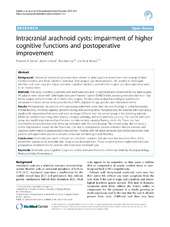| dc.contributor.author | Gjerde, Priyanthi Borgen | en_US |
| dc.contributor.author | Schmid, Marit Therese | en_US |
| dc.contributor.author | Hammar, Åsa | en_US |
| dc.contributor.author | Wester, Knut | en_US |
| dc.date.accessioned | 2013-11-05T11:15:52Z | |
| dc.date.available | 2013-11-05T11:15:52Z | |
| dc.date.issued | 2013-08-28 | eng |
| dc.Published | Journal of Neurodevelopmental Disorders 5(1):21 | eng |
| dc.identifier.issn | 1866-1955 | |
| dc.identifier.uri | https://hdl.handle.net/1956/7481 | |
| dc.description.abstract | Background Intracranial arachnoid cysts have been shown to yield cognitive impairment over a range of basic mental functions, and these functions normalize after surgical cyst decompression. We wanted to investigate whether such cysts may also impair executive cognitive functions, and whether surgical cyst decompression leads to an improvement. Methods This study included 22 patients with arachnoid cysts and 13 control patients scheduled for low back surgery. All subjects were tested with Delis-Kaplan Executive Function System (D-KEFS) tests, assessing executive function 1 day before surgery and a minimum of 3 months after surgery. The data were analyzed according to scaled score computations based on raw scores provided by D-KEFS, adjusted for age, gender, and educational norms. Results Preoperatively, the patients with cysts group performed worse than the control group in verbal knowledge, mental flexibility, inhibitory capacity, problem solving, and planning skills. Postoperatively, the patients with cysts group significantly improved performance and were no longer different from the control group in the following subtests: inhibition, inhibition/switching, letter fluency, category switching, and total switching accuracy. The patients with cysts group also significantly improved performance in color naming, category fluency, and in the Tower test, but nevertheless remained impaired at follow-up compared with the control group. The control group did not show a similar improvement, except for the Tower test. Cyst size or postoperative volume reduction did not correlate with cognitive performance or postoperative improvement. Patients with left-sided temporal cysts performed poorer than patients with right-sided cysts on a complex verbal task demanding mental flexibility. Conclusions Arachnoid cysts seem to impair not only basic cognition, but also executive functions. Most of this impairment appears to be reversible after surgical cyst decompression. These results may have implications for future preoperative considerations for patients with intracranial arachnoid cysts. | en_US |
| dc.language.iso | eng | eng |
| dc.publisher | BioMed Central Ltd. | eng |
| dc.rights | Attribution CC BY | eng |
| dc.rights.uri | http://creativecommons.org/licenses/by/2.0 | eng |
| dc.subject | Arachnoid cysts | eng |
| dc.subject | Cognition | eng |
| dc.subject | Cognitive control | eng |
| dc.subject | Executive functions Intellectual disability | eng |
| dc.subject | Neuropsychology | eng |
| dc.subject | Neuropsychiatry | eng |
| dc.subject | Neurosurgery | eng |
| dc.title | Intracranial arachnoid cysts: impairment of higher cognitive functions and postoperative improvement | en_US |
| dc.type | Peer reviewed | |
| dc.type | Journal article | |
| dc.date.updated | 2013-10-01T19:30:28Z | |
| dc.description.version | publishedVersion | en_US |
| dc.rights.holder | Priyanthi B Gjerde et al.; licensee BioMed Central Ltd. | |
| dc.rights.holder | Copyright 2013 Gjerde et al.; licensee BioMed Central Ltd. This is an Open Access article distributed under the terms of the Creative Commons Attribution License (http://creativecommons.org/licenses/by/2.0), which permits unrestricted use, distribution, and reproduction in any medium, provided the original work is properly cited. | |
| dc.identifier.doi | https://doi.org/10.1186/1866-1955-5-21 | |
| dc.identifier.cristin | 1061174 | |

